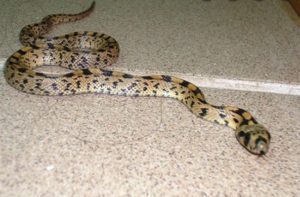 Snakes finding their way inside your house is more disturbing than them staying in your yard. Why? Because they’re literally sharing your living space. Most often they settle in basements because the place is to their liking – cool, damp, dark, lesser human activity and more chances of rodents activity.
Snakes finding their way inside your house is more disturbing than them staying in your yard. Why? Because they’re literally sharing your living space. Most often they settle in basements because the place is to their liking – cool, damp, dark, lesser human activity and more chances of rodents activity.
A pet snake around the house is one thing, but an invader serpent taking residence in a basement is unacceptable for many people. If you have a problem with snakes, make sure your house doesn’t hold anything that could lure them. How you can do that? We are here to give you detailed guidelines on how to keep snakes out of your basement.
How Do Snakes Enter Your House’s Basement
Snakes like to rest in cool and damp places with a bit of privacy and a steady supply of food. Unfortunately, basements or sheds in a building fit that bill perfectly. They don’t just pop up in the interior of your house out of thin air, right? There are ways for them to slither under a building or basement. You must know about those loopholes to ban their entry.
The common ways for snakes to slither are:
- The cracks in the foundations are ideal spots for snakes to get inside a house and make themselves at home.
- Snakes can wriggle their way in through holes of all sizes.
- Uneven door jams, broken windows, gaps near windows and vents, crawl spaces under the doors, unsealed drain holes and cracks in the walls are ideal for entering and exiting a building.
- Dense shrubbery and tall grass near the foundation give snakes perfect cover to wait for the prey without giving themselves away.
How to Keep Snakes Out of the Basement
Keeping snakes out of your property might be a time-consuming task, but it’s not impossible. You can carry out the following steps to prevent snake infestation inside your residence.
-
Seal all the Openings
As we have stated earlier, snakes enter a building through an opening. You don’t have to leave the door ajar for them to slither in. Even a small crack or hole in the foundation is enough to let them in.
You need to cover and mend all the openings near doors, windows, vents, ceilings, drains and pipes to block them out. Pay extra attention to gaps around basement windows.
-
Control Rodents Population
Sometimes a snake follows prey – a rat, mouse or frog – to your location. The serpent might decide to create a den there if the place contains regular rodents’ activity. Wipe rodents, lizards, frogs and insects out of your house to give the reptile one less reason to get attracted to the location.
Take extra pains to cleanse pests infestation from your basement or shed; snakes aren’t the only ones preferring these areas.
Also, get rid of the animals that snakes cannot resist hunting, such as domestic fowl and birds. Snakes seldom miss an opportunity to eat their eggs. Moreover, relocate bird feeders away from your house.
-
Eliminate Hiding Spots
Snakes aren’t daring hunters. They like to take cover to ambush their prey when it least expects. Tallgrass, compost piles, a mound of small rocks, firewood or fallen leaves on your yard allows them to take cover to escape predators.
Similarly, cluttered furniture, boxes or piles of useless stuff in the basement helps them shield themselves.
Regularly trim and weed your garden to erase unnecessary cover. Remove piles of logs, bricks and debris from your property. Furthermore, keep your basement clutterless to ensure snakes have no place to hide there.
-
Remove Standing Water
Snakes also get thirsty, you know. Snakes get attracted to standing water and wet areas for two reasons:
1). To quench their thirst. 2). Excessive moisture and standing water lure amphibians, small mammals, birds and a whole range of insects.
Therefore, remove water puddles, birdbaths and containers containing standing water from your house. Cover pools and hot tubs after use.
In addition, seal your septic systems with mesh material.
-
Use Glue Traps
If there’s a snake already living inside the basement, drive it out before you seal all the openings, including its den. Just leave one gap open for allowing the reptile an exit. Set a glue trap near that opening to capture it. Transport the serpent to its natural habitat and seal that entry point.
You can also use snake repellents to drive them away. Just make sure it has ecologically-friendly ingredients to be safe around children and house pets.
Conclusion
Basements and sheds act as ideal dens for snakes. The serpents may have legit reasons to nest there, but homeowners are often unwilling to let them stay. To avoid facing such troubling circumstances, it is imperative that you make your building unappealing to the reptiles. Clear all the elements that may provide them entry, camouflage and meal to keep them away from your basement and yard. If there’s nothing that may tempt a snake to visit your building, it will wander somewhere else. It’s as simple as that.
